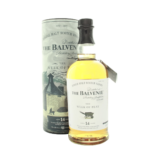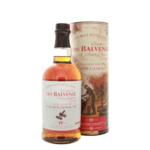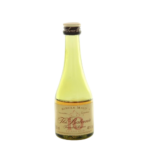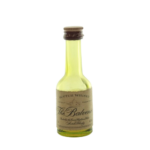
Balvenie The Week Of Peat 14 Year Old
70cl / 48.3%
£75

| Country | scotland |
| Region | speyside |
| Established | 1892 |
| Owner | William Grant and Sons |
| Type | Single malt |
| Number of stills | 5 wash and 6 spirit |
| Visitor center | n/a |
| Status | Active |
| Phone | +44 1340 822210 |
The Balvenie distillery was built in 1892 by William J. Grant. The name Balvenie means 'village of luck'. The company is still in the hands of William Grant & Sons Ltd (The owners of the nearby Glenfiddich distillery). When the distillery was built, Grant had to save a bit on the equipment. The stills were used stills from the Lagavulin distillery. Over the years the Balvenie Whisky became very popular and the distillery increased the number of stills from two to four.
In 1971 the whole distillery was renovated and the number of stills was increased to a total of nine stills. Due to high demand, the malt could not be fully supplied by the malting floors at the distillery. So, the distillery had to buy malt from the big, malting companies. That strategic outsourcing has helped them increase their capacity to a staggering 5.6 million litres per year.
There are several things that make Balvenie special, not the least of which, is that they have their own 1000 acres of barley fields cultivated exclusively for the use in their spirit. They also have their own malting floor, cooperage coppersmith and ageing warehouses on site. This is one of the main reasons that Whisky lovers worldwide consider them to be a throwback to a bygone era.
An interesting fact is that the Balvenie distillery didn't have onsite bottling until 1973. Today it has a big range of standard distillery Whiskies with a common design.
Balvenie, unlike most distilleries, has never left the hands of William J. Grant’s company. It is not uncommon for distilleries to change hands many times throughout their lifetime, but Balvenie has been an exception.
In the 1990s, Balvenie became one of the first distilleries to finish their Whisky, when they released Doublewood. That expression was the ageing for the first ten years in Bourbon casks and then a further 2 years in sherry casks. The Balvenie pioneered this process and are still carrying on with the DoubleWood range today, releasing some of their most expensive malts under this label.
In an abridged form:
Whisky production begins at the distillery on May 1, 1893
In 1923, William Grant passes away and his son, John, begins the first expansion of the distillery
In 1929, The original maltings are replaced with the traditional malting floor we still use today
David C. Stewart MBE begins working with William Grant & Sons in 1962
In 1971 The first official bottling of The Balvenie single malt whisky is released.
In 1987, The Balvenie is released as a 50-Year-Old whisky, one of the industry’s first bottling of such great age.
In 1993, The Balvenie is relaunched on the occasion of the distillery’s centenary in three iterations: Founder’s Reserve Aged 10 Years, DoubleWood Aged 12 Years and Single Barrel Aged 15 Years.
In 2004, David C Stewart MBE celebrates 30 years as our Malt Master and The Balvenie Aged THIRTY Years is launched.
In 2010, Tun 1401 was launched, the first of the Tun range in which David C. Stewart MBE selects some of his favourite rare casks from their oldest warehouses then marries them in a Tun.
In 2014, Tun 1509 replaces Tun 1401 after nine batches of the latter.
In 2015, The Balvenie DCS Compendium launches as handover notes of David's knowledge and expertise within the whisky industry in liquid and literary form.
Sorry, there are no news from this distillery yet.

70cl / 48.3%
£75

70cl / 47.5%
£269

5cl / 40%
£19

100cl / 50.4%
£299

3cl / 40%
£19
About Glenbotal
The idea of Glenbotal came to us naturaly: as whisky lovers, we were always on the lookout for new experiences in the whisky world. That’s why we created Glenbotal and became our very own first customers. We buy unique and hard to find spirits from auctions, ballots, and private collections. Then, we share them with a small circle of friends and people who can appreciate a good dram.